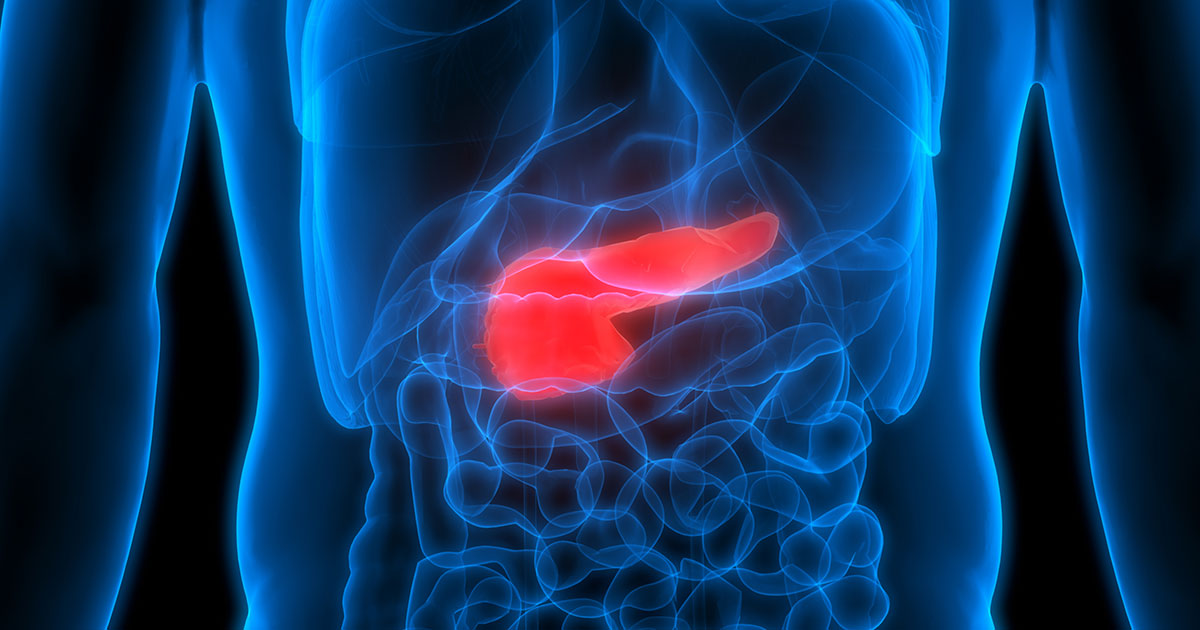
Pancreatic cancer is a silent killer. Symptoms of pancreatic cancer are easy to miss in its early stages or may even be nonexistent, making it harder to diagnose and treat the disease before it’s spread. In some people, signs of pancreatic cancer may be mistaken for other conditions. That’s why in more 50 percent of cases, it’s detected at an advanced stage of disease.
More than 62,000 Americans are diagnosed with pancreatic cancer each year, according to the American Cancer Society. Because it’s so difficult to detect early, only one in 10 patients with cancer of the pancreas survive more than five years after a diagnosis, according to the National Cancer Institute’s Surveillance, Epidemiology, and End Results (SEER) Program.
A handful of conditions may raise the risk for developing pancreatic cancer. Knowing these pancreatic cancer risk factors may lower your risk by helping to identify the disease before it’s progressed to advanced stages.
To help you recognize these risk factors, this article details the connection between these conditions and pancreatic cancer:
If you believe you may be experiencing signs of pancreatic cancer and want to schedule a consultation, or if you’re interested in a second opinion on your diagnosis and treatment plan, call us or chat online with a member of our team.
Diabetes
The connection between diabetes and pancreatic cancer has been well known for decades. But only in recent years have scientists discovered diabetes not only raises the risk for pancreatic cancer, but it may also be a symptom of the cancer itself.
Research shows that high glucose levels in the blood, a symptom of both type 1 and type 2 diabetes (previously known as adult-onset diabetes), may lead to cancer. Pancreatic cancer may also cause cells in the body to become resistant to insulin (a key hormone produced by the pancreas that regulates blood sugar), resulting in diabetes.
Pancreatitis
Pancreatitis—chronic or acute inflammation of the pancreas—is another risk factor for pancreatic cancer. Scientists have found that chronic pancreatitis (lasting more than five years) and acute pancreatitis (sudden-onset inflammation of the pancreas) may boost the risk of developing cancer as much as eight-fold.
Symptoms of both conditions may be similar—stomach pain, digestive problems, nausea, weight loss, fever—so it’s important that your doctor monitor you closely to determine whether you have pancreatitis vs. pancreatic cancer. But keep in mind: Pancreatitis may or may not cause symptoms.
Lynch syndrome
Lynch syndrome is a genetic condition linked to colorectal cancer, but it may also increase the risk of developing pancreatic cancer. The syndrome, also known as hereditary nonpolyposis colorectal cancer (HNPCC), is caused by mutations in genes that impact cells’ ability to repair damage to their DNA.
According to the American Society of Clinical Oncology, Lynch syndrome affects about one in every 300 people. If one of your parents has the syndrome, you have a one-in-two chance of inheriting the mutation, too. But while Lynch syndrome and other cancer-causing mutations may increase your lifetime risk of cancer, it doesn’t mean that a cancer diagnosis is inevitable.
Gene mutations
Most pancreatic cancers are not inherited—one in 10 cases is related to genetic causes, studies show. But some gene mutations and genetic syndromes may increase the risk for pancreatic cancer, as well as other cancers, because they share common DNA links, including those below.
BRCA1, BRCA1 and PALB2: Cancer gene mutations well known for their links to breast and ovarian cancer
p16/CDKN2A and CDK4: Genetic variants associated with familial atypical multiple mole melanoma (FAMMM) syndrome
MLH1, MSH2 and EPCAM: Mutations linked to Lynch syndrome
CFTR: Variants linked to cystic fibrosis that have also been tied to pancreatitis, as have variations in CASR, CPA1, CTRC, PRSS1 and SPINK1 genes
ATM mutations: Genes associated with Ataxia-telangiectasia, also called Louis-Bar syndrome, as well as breast cancer
If you have a family history of pancreatic cancer, genetic testing may help determine whether you’re at risk and detect pancreatic cancer early, when it’s easier to treat.
Participation in genetic or family pancreatic cancer registries may also help researchers identify genetic mutations linked to familial pancreatic cancer and potentially develop a screening test in the future.
Peutz-Jeghers Syndrome
Another genetic condition associated with pancreatic cancer is Peutz-Jeghers Syndrome (PJS), which causes a certain type of polyp to grow in the digestive tract, lungs and nose. These so-called hamartomatous polyps may be benign, but they cause other health problems, like gastrointestinal blockages or bleeding.
PJS is caused by a defect in the STK11 gene, which stops cells from growing uncontrollably and developing into cancer. People with PJS have an increased risk for developing pancreatic cancer, as well as cancers of the GI tract, cervix, breasts and ovaries.
Another symptom of this disorder that typically shows up in childhood is dark, pigmented spots on the fingers, mouth and lips, and near the eyes and nose.
Hepatitis
Several forms of hepatitis (inflammation of the liver) may also increase the risk for pancreatic cancer. One potential explanation: The liver’s proximity to the pancreas and the fact that the liver and pancreas share common blood vessels and ducts may make the pancreas a potential target organ for hepatitis viruses, research shows.
Hepatitis A: This form of the disease—caused by ingesting food or water contaminated with fecal bacteria or through contact with an infected person—may last from a few weeks to several months and has been found to increase the risk for acute pancreatitis, which in turn may raise cancer risk.
Hepatitis B: One study of nearly 70,000 pancreatic cancer patients found up to a 24 percent increased risk for pancreatic cancer among people with hepatitis B, which is spread through blood, semen or other bodily fluids. The condition may last a few weeks or become a lifelong, chronic illness.
Hepatitis C: In another study of more than 146,000 veterans with hepatitis C, a blood-borne disease that may also become a lifelong, chronic illness, found that the virus increases a person’s risk for a highly fatal cancer of the biliary tree—the bile-carrying pathway between the liver and pancreas. Some follow-up studies have also suggested a link between hepatitis C and pancreatic cancer.
Obesity
Obesity is yet another contributing factor to pancreatic cancer. Fat tissues in overweight people produce more hormones and growth factors than those in people of a healthy weight. High levels of some of these hormones, including insulin produced in the pancreas, may increase the risk of pancreatic cancer.
New research suggests the global “obesity epidemic” may lead to up to 670,000 new cancer cases over the next 20 years, including pancreatic cancers. That study by Cancer Research UK and the UK Health Forum notes pancreatic cancer is one of the 10 types of cancers that may be caused by excess weight or obesity.
One British study estimates nearly 13 percent of all pancreatic cancers are attributable to being overweight or obese.
Pancreatic cancer care at City of Hope
At City of Hope, we know that no two pancreatic cancer cases are alike. So, our treatment options are specific to each patient’s needs, goals and preferences.
City of Hope offers advanced pancreatic cancer treatments, including gastrointestinal procedures and interventional radiology., And our multidisciplinary team of board-certified specialists works closely with you to help you make informed decisions about your care. Advanced genomic testing allows our doctors to examine the molecular structure of cancer cells, looking for mutations or biological features that may be driving a tumor’s growth. This may allow our cancer experts to recommend targeted, precision-medicine treatments based on these unique characteristics.
If you believe you may be experiencing signs of pancreatic cancer and want to schedule a consultation, or if you’re interested in a second opinion on your diagnosis and treatment plan, call us or chat online with a member of our team.


